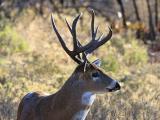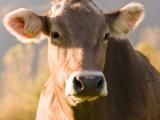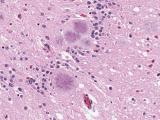Jul 10, 2006 (CIDRAP News) Canadian officials announced today they are awaiting the results of confirmatory tests in what could be the country's seventh case of bovine spongiform encephalopathy (BSE), or mad cow disease.
Samples from a cow from Alberta are being tested at the National Reference Laboratory in Winnipeg, Man., the Canadian Food Inspection Agency (CFIA) announced. Preliminary tests in Canada's regular BSE surveillance program "were not able to rule out BSE," the agency said.
The announcement comes just 6 days after Canada confirmed its sixth BSE case, in a 15-year-old crossbred cow from Manitoba. The new suspected case is in a 50-month-old dairy cow, no part of which entered the human food or animal feed systems, officials said.
"This detection is consistent with a low level of disease and does not indicate an increased risk of BSE in Canada," the agency said.
Given its age, the cow would have been exposed to BSE after the 1997 start of Canada's ban on using cattle protein in feed for cattle and other ruminants. The CFIA said international experience "demonstrates that BSE cases born after the introduction of feed bans are seen in other countries affected by the disease."
The CFIA is gathering more information about the cow and looking for other cattle born on the same farm within a year before or after the animal's birth. In addition, the agency is conducting an "exhaustive investigation" for possible routes of infection on the farm.
As it has done after previous case discoveries, the CFIA said Canada's food supply is protected by the removal of specified risk materials (SRM) from all cattle slaughtered for human food. SRM include the brain, spinal cord, and other tissues that contain the BSE agent (abnormal prion protein) if an animal is infected.
Two weeks ago, the CFIA announced it would expand its feed ban to exclude SRM from all animal feeds, pet food, and fertilizers. The change is scheduled to take effect a year from now.
The US Department of Agriculture published no immediate statement on the new potential case. After Canada's sixth case was confirmed last week, the USDA's chief veterinary officer, Dr. John Clifford, commented in a prepared statement, "We will review the information gathered through Canadas epidemiological investigation but it is important to note that we have anticipated that there may be additional detections of BSE in Canada. These additional finds have already been factored into our current beef trading relationship with Canada and we do not expect that this latest case would cause any disruption to our trade in beef or beef products from Canada."
The United States banned cattle and beef imports from Canada after the first Canadian BSE case was found in May 2003. In August 2003 the USDA loosened the ban to allow imports of boneless beef from cattle less than 30 months old. The border was reopened in July 2005 to live Canadian cattle intended for slaughter before reaching the age of 30 months.
See also:
Jul 5 statement by Dr. John Clifford of USDA
http://www.aphis.usda.gov/newsroom/content/2006/07/bse-can_statement.shtml
















